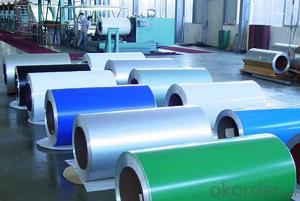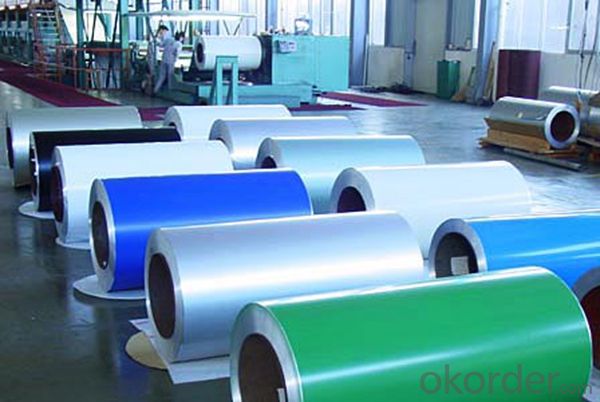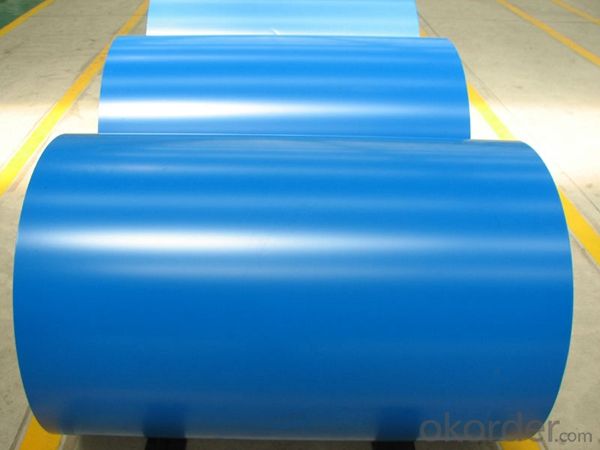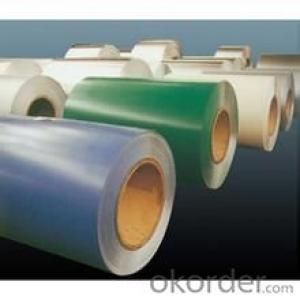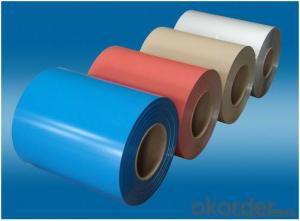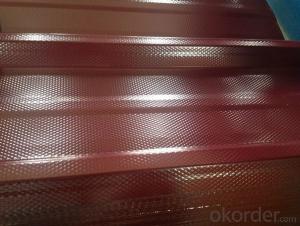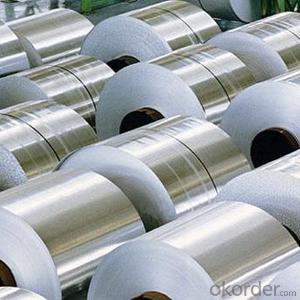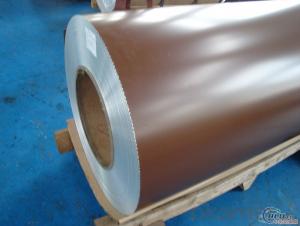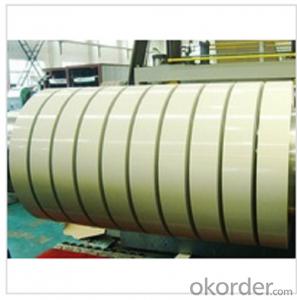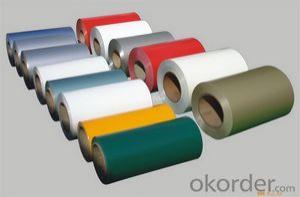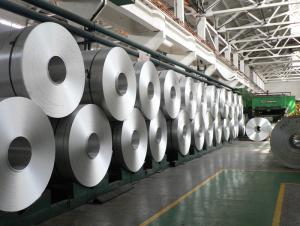Aluminum Coil Sheet 3003 for Curtain Wall Decoration - Color Coating
- Loading Port:
- Shanghai
- Payment Terms:
- TT OR LC
- Min Order Qty:
- 5 m.t.
- Supply Capability:
- 100000 m.t./month
OKorder Service Pledge
OKorder Financial Service
You Might Also Like
Specification
1. Specification of Color Coating Aluminium Coil 3003 for Curtain Wall Decoration
Name | 3003 Aluminum Coil |
Brand | CNBM |
Alloy | 1100H-18, 3003-H24,3003-H26,3005-H26,8011,3004,3105,5005,etc. |
Thickness | 0.1~1.5mm |
Width | <2000mm< span=""> |
MOQ | 1 MT |
Coating finish | Brushed, drawing, embossed, printing |
Color | As to code RAL |
Surface | Embossed,Mill Finish,Coated,Brushed |
Gloss | 10-90%(EN ISO-2813:1994) |
Total coating thick | PVDF27 ~35micron |
Polyester18~27micron(EN ISO-2360:1995) | |
Coating hardness | 2H |
Adhesion | 5B (EN ISO-2409:1994) |
Impact resistance | No cracking and peeling (A.S.T.M D2794-1993) |
Flexibility (T-bend) | 0T- 2T |
MEK resistance | 100 |
Certification | ISO9001:2000, CE, SGS |
Coil's standard diameter | 1100mm |
Inner Diameter | 405mm/505mm |
Coil's standard weight | 1MT - 2MT |
2. Application of Color Coating Aluminium Coil 3003 for Curtain Wall Decoration
(1).Interior: wall cladding, ceilings, bathrooms, kitchens and balconies, shutters, doors...
(2).Exterior: wall cladding, facades, roofing, canopies, tunnels,column covers , renovations...
(3).Advertisement: display platforms, signboards, fascia, shop fronts...
3. Feature of Color Coating Aluminium Coil 3003 for Curtain Wall Decoration
*Such coil is specially designed to replace aluminum ingot, due to the high export tax of aluminum ingot, the coil has better price than ingot.
*This type of coil can fit customer's remelting furnace just like ingot, no need to make any change to the production line that was previously used for ingot. The standard coil size and weight is very suitable for the feed gate of furnace.
*This type of coil causes less material wastage than ingot when remelted.
*Our coil is made directly from ore, no need to go though the ingot making process, quality is much better than other suppliers who use ingot scrap to make coil.
Be free from Oil Stain, Dent, Inclusion, Scratches, Stain, Oxide Dicoloration, Breaks, Corrosion, Roll Marks, Dirt Streaks and other defect which will interfere with use
4. Certificate:
SGS and ROHS(if client request, paid by client), MTC(plant provided), Certificate of Origin(FORM A, FORM E, CO), Bureau Veritas and SGS (if client request, paid by client), CIQS certificate
5. Image of Color Coating Aluminium Coil 3003 for Curtain Wall Decoration
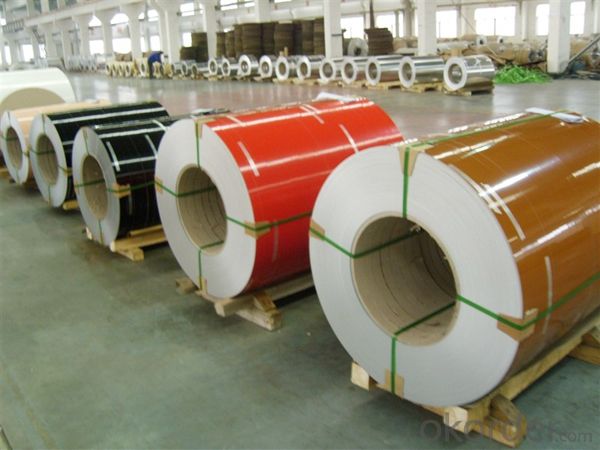
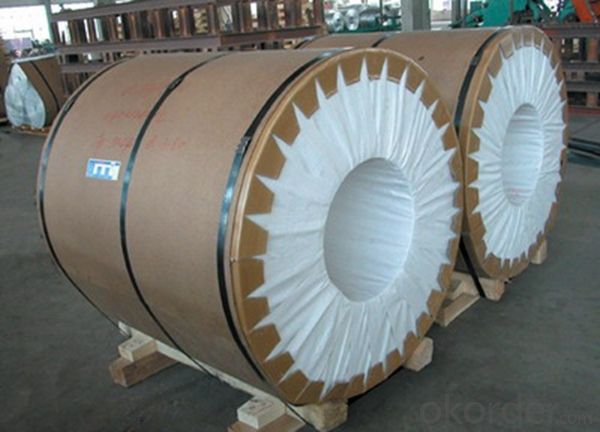
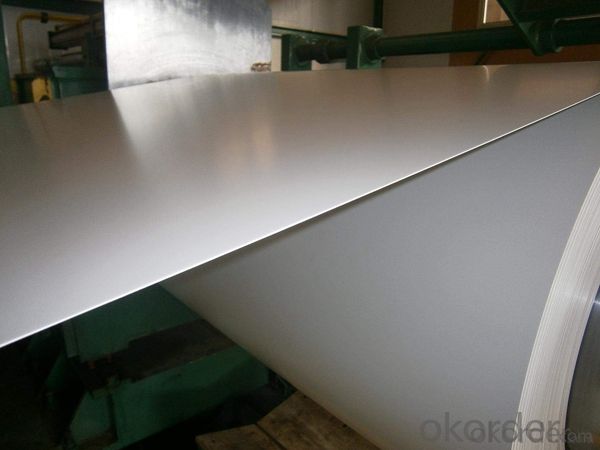
6. Package and shipping of Color Coating Aluminium Coil 3003 for Curtain Wall Decoration
eye to wall
eye to the wall
with wood pallet (wooded case also available)
7. FAQ
1) What is the delivery time?
Dpends on actual order, around 20 to 35 days
2)What is the QC system:
We have QC staff of 20 persons and advanced equipment, each production is with MTC traced from Aluminum ingot lot.
3) What market do you mainly sell to?
Australia, America, Asia, Middle East, Western Europe, Africa etc
- Q: Are aluminum coils suitable for electrical conductivity?
- Indeed, aluminum coils prove to be suitable for electrical conductivity. With its conductivity rating at approximately 62% of the International Annealed Copper Standard (IACS), aluminum stands as a highly conductive material. Consequently, aluminum coils emerge as an exceptional choice for a variety of electrical applications, encompassing power transmission and distribution, electrical motors, and transformers. Furthermore, aluminum coils present a range of advantages, including their lightweight nature, high resistance to corrosion, and lower cost in comparison to copper coils. Nevertheless, it is crucial to acknowledge that aluminum exhibits a lower conductivity than copper, thus potentially necessitating larger aluminum coils to attain the same level of conductivity as smaller copper coils. In summary, aluminum coils remain a viable and frequently employed option for electrical conductivity.
- Q: Can aluminum coils be welded or joined together?
- Yes, aluminum coils can be welded or joined together. Welding is a common method used to join aluminum coils, especially in industries such as automotive, aerospace, and construction. There are different welding techniques that can be employed, such as TIG (tungsten inert gas) welding, MIG (metal inert gas) welding, and spot welding. These methods allow for the creation of strong and durable joints between aluminum coils. Additionally, other joining methods like adhesive bonding or mechanical fastening can also be used depending on the specific application requirements. Overall, with the appropriate welding or joining technique, aluminum coils can be effectively and securely joined together.
- Q: Why do we need aluminum when cooking in the oven at all.
- Function Of Aluminium Foil
- Q: Are aluminum coils suitable for air conditioning systems?
- Yes, aluminum coils are suitable for air conditioning systems. Aluminum coils are commonly used in air conditioning systems due to their many advantages. Firstly, aluminum is a lightweight material, making it easier to handle and transport during installation. This also reduces the overall weight of the unit, making it more energy-efficient. Furthermore, aluminum coils have excellent heat transfer properties, allowing for efficient cooling of the air. They provide enhanced thermal conductivity, which helps in transferring heat quickly and effectively. This results in better cooling performance and improved energy efficiency, reducing electricity consumption and saving costs in the long run. Aluminum coils also offer superior corrosion resistance compared to other materials like copper. This is important in air conditioning systems, as they are exposed to moisture and humidity. Aluminum coils can withstand these conditions without corroding or deteriorating, ensuring longer lifespan and reliable performance. Another advantage of aluminum coils is their affordability. Aluminum is a cost-effective material, making it a popular choice for air conditioning manufacturers. This affordability can translate to lower costs for consumers, making air conditioning systems more accessible and affordable. In conclusion, aluminum coils are suitable for air conditioning systems due to their lightweight, excellent heat transfer properties, corrosion resistance, and affordability. They provide efficient cooling, durability, and cost-effectiveness, making them a preferred choice for air conditioning units.
- Q: What are the methods to prevent rust formation on steel coils during storage and transportation?
- <p>To prevent rust on steel coils during storage and transportation, follow these steps: 1. Keep the coils dry and avoid exposure to moisture. 2. Use rust inhibitors or anti-corrosion coatings on the coils. 3. Store the coils in a clean, dry, and well-ventilated area. 4. Use protective wrapping materials like plastic film or corrosion-resistant paper. 5. Ensure proper stacking and avoid direct contact between coils. 6. Use rust-resistant materials for transportation containers. 7. Regularly inspect the coils for signs of rust and address any issues promptly. By implementing these measures, you can significantly reduce the risk of rust formation on steel coils.</p>
- Q: How are aluminum coils tested for quality assurance?
- Aluminum coils are tested for quality assurance through various methods such as visual inspections, dimensional checks, mechanical testing, and chemical analysis. These tests ensure that the coils meet the required specifications and standards, ensuring their quality, durability, and performance.
- Q: How are aluminum coils used in insulation applications?
- Aluminum coils are commonly used in insulation applications as they are lightweight, durable, and have excellent thermal conductivity properties. They are typically used to create a radiant barrier or reflective insulation, where they are installed between the outer walls or roofs of a building and the insulation material. The reflective surface of the aluminum coil helps to reflect radiant heat away from the building, reducing heat transfer and improving energy efficiency. Additionally, aluminum coils are also used in HVAC systems to create air ducts that ensure proper insulation and prevent heat loss or gain.
- Q: What are the storage life and shelf life of aluminum coils?
- Various factors, such as storage conditions and the specific type of aluminum alloy, can influence the storage life and shelf life of aluminum coils. Generally, aluminum coils have a relatively long lifespan. Concerning storage life, aluminum coils can be stored for an extended period without significant quality or performance degradation. However, it is crucial to store them in a dry, well-ventilated area to prevent corrosion. Moisture can cause oxidation and corrosion, which may compromise the integrity and durability of the aluminum coils. Regarding shelf life, aluminum coils can remain in good condition and retain their functionality for a prolonged period if stored correctly. The exact shelf life depends on the specific application and intended use of the aluminum coils. To ensure the longevity of aluminum coils, it is advisable to adhere to the manufacturer's storage and handling guidelines. Regular inspections and maintenance can also help detect any signs of corrosion or damage, enabling appropriate measures to prevent further deterioration.
- Q: How is Aluminum formed??Thanks!!
- I don't think any significant quantity of aluminum is produced by reduction with carbon - aluminum is too reactive for this to give a good yield. Instead, the metal is produced by electrolysis in the Hall-Heroult process. First, aluminum ore is processed to aluminum oxide in the Bayer process. This ore, bauxite, consists of aluminum oxides and hydroxides with some impurities, mostly iron oxides. The aluminum oxide/hydroxides are dissolved with concentrated sodium hydroxide in water. Iron oxides and hydroxides do not dissolve, and are filtered out. AlOOH (insoluble in water) + NaOH + H2O ----- NaAl(OH)4 (soluble in water) Neutralizing or cooling this solution will cause aluminum hydroxide to precipitate out. This is then heated strongly to drive off water and produce aluminum oxide. 2Al(OH)3 ----- Al2O3 + 3H2O This aluminum oxide can be melted and then electrolyzed to make the metal and oxygen gas. However, the melting point of aluminum oxide is very high, so it is dissolved in molten cryolite (Na3AlF6), which has a lower melting point. This is then electrolyzed, and molten aluminum collects at the bottom of the cell (cathode), where it can be drawn off. Because the oxygen that would be formed will attack most metal electrodes, a sacrificial carbon electrode is used for the anode and is oxidized to CO2. Very small amounts of aluminum metal occur in nature - it is usually found in association with fossil fuel deposits (which provide the reduced carbon necessary to reduce aluminum minerals).
- Q: What are the potential fire hazards associated with aluminum coils?
- There are several potential fire hazards associated with aluminum coils. First and foremost, aluminum is a highly flammable material, which means it can catch fire easily and burn quickly. This poses a significant risk if there is an ignition source nearby, such as an open flame, electrical spark, or hot surface. Another potential fire hazard is the accumulation of dust, dirt, or other combustible materials on the aluminum coils. These substances can act as fuel for a fire, increasing the likelihood and intensity of combustion. It is important to regularly clean and maintain the coils to prevent the buildup of such materials. Aluminum coils are often used in HVAC systems, and if these coils are not properly installed or maintained, they can become a fire hazard. For instance, if the coils are not securely fastened or if there are loose electrical connections, it can lead to overheating and potentially cause a fire. Additionally, aluminum coils can cause electrical fires if they come into contact with live electrical wires or if there is a short circuit. This can happen if the coils are installed too close to electrical components or if there is a failure in the insulation or grounding of the system. Lastly, the use of flammable refrigerants in HVAC systems can also increase the fire risk associated with aluminum coils. If there is a leak or malfunction in the refrigerant system, it can create a flammable atmosphere around the coils, leading to a potential fire or explosion. To mitigate these fire hazards, it is crucial to follow proper installation guidelines, regularly inspect and maintain the coils, keep the surrounding area clean and free from combustible materials, and ensure that there are no electrical or refrigerant leaks in the system. It is also recommended to have fire detection and suppression systems in place to quickly respond to any potential fire emergencies.
Send your message to us
Aluminum Coil Sheet 3003 for Curtain Wall Decoration - Color Coating
- Loading Port:
- Shanghai
- Payment Terms:
- TT OR LC
- Min Order Qty:
- 5 m.t.
- Supply Capability:
- 100000 m.t./month
OKorder Service Pledge
OKorder Financial Service
Similar products
Hot products
Hot Searches
Related keywords
